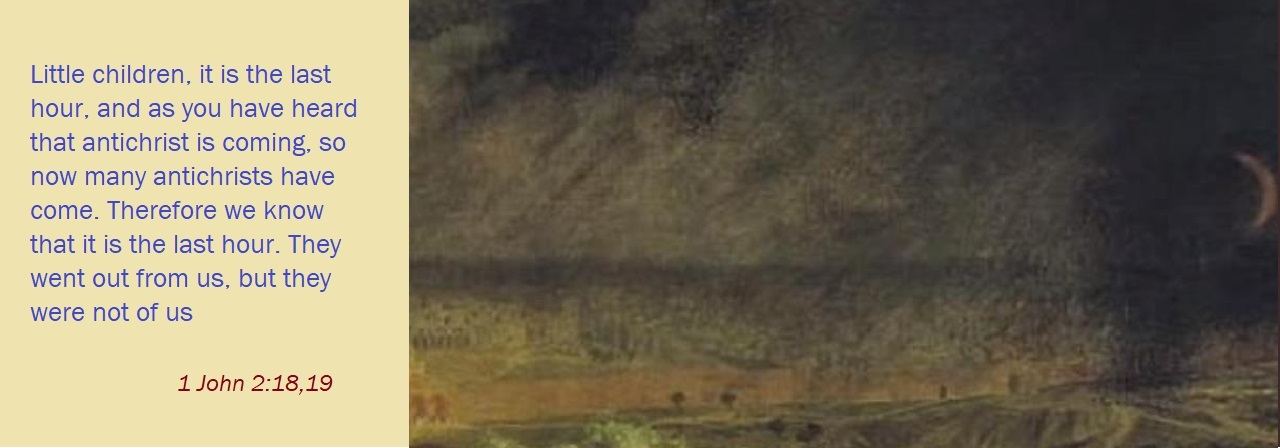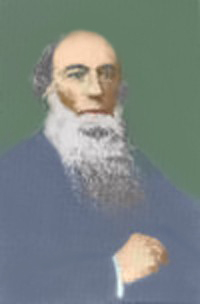
Biblical Evidence for the 1st Century Return of Christ
… parousiafulfilled.com
“Children [Gk: παιδία: paidia = little children], it is the last hour, and as you have heard that antichrist is coming, so now many antichrists have come. Therefore we know that it is the last hour. They went out from us, but they were not of us; for if they had been of us, they would have continued with us. But they went out, that it might become plain that they all are not of us.” (1 John 2:18,19)
Who or what is antichrist? Apostle John is the only New Testament writer who uses this name: “antichrist” It never appears in any other scripture. James Stuart Russell 1 in his book, “The Parousia” 2 (330) observed:
“St. John evidently speaks of ‘the antichrist’ as an idea familiar to his readers,---a power whose coming was anticipated, and whose presence was an indication that ‘the last hour’ had come.” [ed: see: v.18 above]
John plainly stated (circa AD 62) that, it was ALREADY THE “LAST HOUR” in his days and that there were already “MANY ANTICHRISTS” in the world. He goes on to identify whom he is talking about:
“Who is the liar but he who denies that Jesus is the Christ? This is the antichrist, he who denies the Father and the Son.” (1 John 2:22)
He explains further:
“For many deceivers have gone out into the world, those who do not confess the coming of Jesus Christ in the flesh. Such a one is the deceiver and the antichrist.” (2 John :7)
Note John’s plain statement: “SUCH A ONE IS THE DECEIVER AND THE ANTICHRIST”. They were originally in the Christian Church, but “they went out from us”.
Russell (331) notes:
“This proves that the antichristian opponents of the Gospel must at some time have made a profession of Christianity, and afterwards have become apostates from the faith.”
Futurists claim that “antichrist” is a particular person, but Russell (331) dismisses that idea:
“the name ‘the antichrist’ is supposed to designate a particular individual, the incarnation and embodiment of enmity to the Lord Jesus Christ; and as no such person has hitherto appeared in history, they have concluded that his manifestation is still future, but that the personal antichrist may be expected immediately before the ‘end of the world.’ ”
“It is impossible, with this declaration of St. John before us, ---‘Even now are there many antichrists’--- to regard the antichrist as a single individual. … The expression ‘many antichrists’ proves that the name is not the exclusive designation of any individual.”
Some futurists claim that the papacy is the incarnation and embodiment of “the antichrist”. Dr John Alford 3 dismissed this idea:
“If the Papacy be antichrist, then has the manifestation been made, and endured now [ed: in 1880s] for nearly 1500 years, and yet that day of the Lord is not come which, by the terms of our prophecy, such manifestation is immediately to precede.”
Russell (333) concludes that:
“The antichrist of St. John is not a person, nor a succession of persons, but a doctrine, or heresy, clearly noted and described. More than this, it is declared to be already existing and manifested in the apostle’s own days: ‘Even NOW are there many antichrists;’ ‘this is that spirit of antichrist, whereof ye have heard that it should come; and even now already is it in the world’ (1 John vi. 18; iv. 3) [ed: KJV]. This ought to be decisive for all who bow to the authority of the Word of God. The hypothesis of an antichrist embodied in an individual still to come has not basis in Scripture; it is a fiction of the imagination, and not a doctrine of the Word of God.”
Russell (334) summarises the main features of this antichristian heresy or apostasy:
1. That the antichrist was not an individual, or a person, but a principle, or heresy, manifesting itself in many individuals.
2. That the antichrist or antichrists were apostates from the faith of Christ (ver. 19).
3. That their characteristic error consisted in the denial of the Messiahship, the divinity, and incarnation of the Son of God.
4. That the antichristian apostates described by St. John may possibly be the same as those denominated by our Lord ‘false christs and false prophets’ (Matt. xxiv. 5, 11, 24), but certainly answer to those alluded to by St. Paul, St. Peter, and St. Jude.
5. All the allusions to the antichristian apostasy connect its appearance with the ‘Parousia’' and with ‘the last days’ or close of the aeon or Jewish dispensation. That is to say, it is regarded as near, and almost already present.
Thus we see that there is no one specific person denoted as “the antichrist” in the New Testament. In John’s epistles he plainly identifies deceivers and liars as “antichrist”. He declares that ‘many antichrists’ have arisen, and were already appearing in the 1st century AD, before the fall of Jerusalem. The expression “antichrist” is a general disposition of unbelief: a heresy, not a specific person.
Read more on the parousia (“Second Coming”) of Christ in these articles:
NB: “Unless Otherwise indicated, all Scriptures are from the Holy Bible, English Standard Version, copyright © 2001, 2007, 2011, 2016 by Crossway Bibles, a division of Good News Publishers. Used by permission. All rights reserved.”

1… James Stuart Russell (1816-1895) was a minister in the Congregational Church at Great Yarmouth, Tottenham, Edmonton, and Bayswater. He held to a past fulfillment of the Second Advent and in 1878 he published a book on this subject, originally entitled “The Parousia: The New Testament Doctrine of Our Lord’s Second Coming”.
Photo of J S Russell: author of “The Parousia”. Photograph, colorized by Virgil Vaduva
2… “The Parousia: The New Testament Doctrine of Our Lord’s Second Coming”, by Russell, James Stuart, International Preterist Association, Bradford PA, 2003. (Originally published by T. Fisher Unwin, London, 1887).
3… “Greek Testament”, by Alford, Dr. John; p66, cited in Russell p333.
copyright © 2019‐2023 Kenneth Higgs ‐ ParousiaFulfilled.com ‐ v2.01